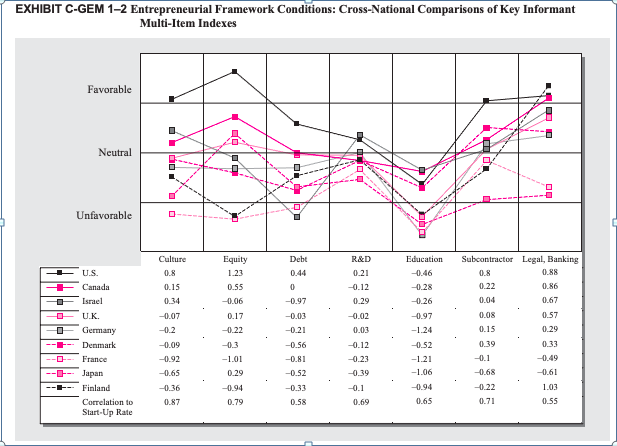GEM Case Study Solution
The study measured how entrepreneurship increased based on access to programs and education. For example, researchers measured how programs directed toward potential women entrepreneurs increased interest in becoming an entrepreneur. Programs were also offered to different age groups than the norm to discover the correlation between these programs and higher interest in entrepreneurship. However, longitudinal studies were developed for other countries lacking in variable control. These longitudinal studies attempted to measure the effect on economic growth with a new conceptual model involving cultural, economic, physical, and political factors (Schindler 2019).
Impact on Study
In chapter 5, Schindler states, “probability sampling is based on the concept of random selection - a controlled procedure that assures that each case is given a known nonzero chance of selection” (Schindler, 2019, p. 96). The researchers’ research design was simple random sampling. The researchers gathered information from two rounds of adult population surveys in different countries. The two rounds of adult population surveys were 1,000 randomly selected adults from the study’s participating countries. The researchers completed surveys by phone, face-to-face interviews, and an interview with 4-39 national experts (key informants) in each county to collect data to measure entrepreneurial activity and attitude.
A key informant (national expert) is a person with first-hand knowledge about the topic of interest. In the GEM study, national experts (key informants) were pertinent from each country because they understood their countries' nine entrepreneurial framework conditions. Due to the GEM study's importance, the sample population of 1,000 participants from each country for this study was fitting. The impact is significant when identifying and weighing entrepreneurial framework conditions using national experts (key informants) to collect information from each country. The use of key informants will make sure the researchers gather information from the participants with first-hand knowledge about the community's social, cultural, and political aspects, gaining a good influence on the study's results. The key informants were critical in identifying and weighing the entrepreneurial framework conditions due to the different participants, awareness, and credibility.
Diversity: The different countries' participants guarantee the researchers of the case study to truly gain knowledge about the participants' economies because of the diverse opinions and skill levels in the study. The study's essential part is to use data from 9 nations to prove or disprove a new conceptual model to predict economic growth.
Awareness: The researchers included 1,000 adults from different countries, which means that they might be receiving information that might not be credible due to the participants' lack of knowledge about the subject. The key informants completed a detailed 12-page questionnaire that gave researchers rich data to observe and understand the social, cultural, political, and entrepreneurial activity in each country. Including the study's key informants makes the study more credible for people to learn how to predict economic growth.
Credibility: In the GEM study, the researchers must analyze the data to identify and measure entrepreneurial framework conditions. The researchers must look at the government policies and initiatives of each country to see which activities generate a high level of entrepreneurship. If the study did not include the key informants, there is a possibility that some countries' information would not be included in the study. For the study to be credible, the researchers must include the key informants to ensure key informants in the community can explain different aspects of the economic data on how to increase entrepreneurial activity.
Results of a causal study
The final question asks whether this study can be conducted when much of the data collected is descriptive opinion and ordinal or interval data. For this study the answer is yes. In this study, we can see a qualitative (descriptive opinion) study of ordinal data. The ordinal data provides a classification and order of the groups over a specified period of time. And although much of the primary data collected is descriptive opinion; there is still a need to address the reliability and validity of that data. Opinions pertaining to entrepreneurship can be subject to misinterpretation across different cultural, economic, physical, and political landscapes. Each country in this study may have different perceptions of entrepreneurship. It would also be suggested that more countries not included in the original study be tested. Additional countries included in this study will confirm the influence of different variables. Finally, the statistical results of the research will need to be continually tested over different periods of time to realize the net effects. Replication of these tests will be able to determine if the study is reliable in the long term.
Conclusion
Global Entrepreneur Monitor (GEM) is an organization assigned with researching ways to stimulate entrepreneurship activity during phases of economic decline.The study aims at developing a conceptual framework, which could provide strategies for enhancing the entrepreneurial activities.The data has been gathered from nine nations, in order to accommodate the lacked control in exogenous variables. The research design was based on simple random sampling, whereby the researcher gathered information in two rounds through the adult population surveys, conducted in different countries.
A total of 1000 surveys were conducted with randomly selected adult population.In this study, we can see a qualitative (descriptive opinion) study of ordinal data. Exhibit 1-2 shows the key findings of the study i.es the comparison across different countries in entrepreneurial conditions. The results conclude that US has been the most favorable among the entrepreneurial conditions and France is most unfavorable. The results conclude that different countries have different perceptions of entrepreneurship, with US being the most favorable in terms of culture, equity, debt, R&D, education sector, subcontractor and legal banking.........................
This is just a sample partial case solution. Please place the order on the website to order your own originally done case solution.














